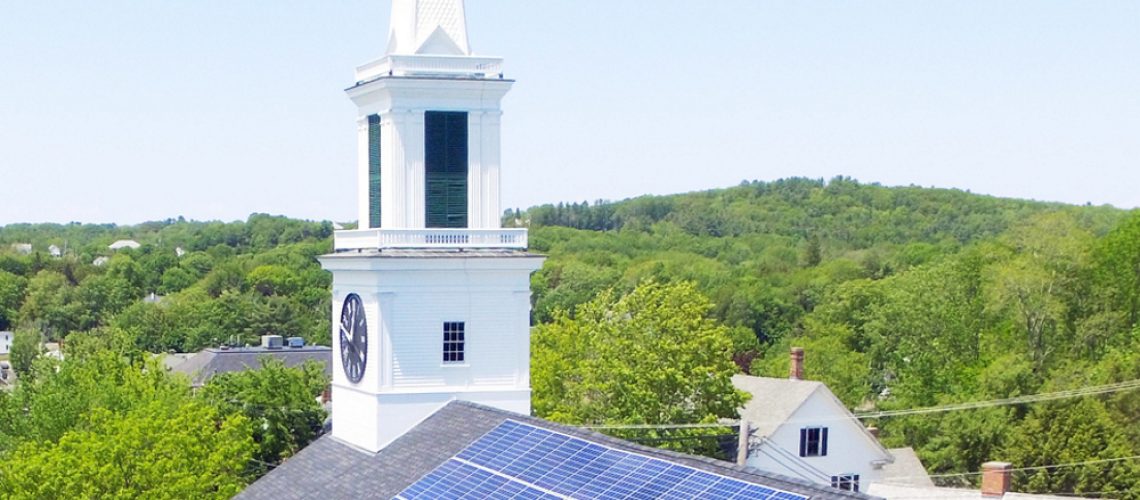In one Florida town, NREL researchers worked with local stakeholders and community members to develop a guide for installing solar panels on churches and other commercial-scale buildings across the state.
The Black Farmer’s Collaborative (the Collaborative) is working with the U.S. Department of Energy, National Renewable Energy Laboratory (NREL) researchers to scale the implementation of clean energy technology, intended to increase income and provide opportunities to build generational wealth.
The first is building solar panels on Cetta Barnhart’s demonstration farm in Monticello, a city in Jefferson County. Otherwise known as agrivoltaics, her PV system will benefit crops by increasing their resistance to extreme weather, thus growing the farm’s crop yield.
The second project will take place 25 miles east of Tampa in a town called Bealsville, where solar panels will be installed on churches and commercial buildings in and around the area.
Agrivoltaic system
Barnhart, the Collaborative, and NREL agrivoltaics researchers worked together to design six possible systems to support her farm’s crops. Models of the panels helped stakeholders gauge installation costs, energy output, and crop production.
“We chose to do it on a demo farm run by a woman who is respected and known in the community,” said Velma Deleveaux, the Collaborative member and managing partner of the business consulting firm Veaux Solutions.
Barnhart’s 14.5-acre farm provides fresh foods to families in Northern Florida that they can pick up or deliver. She hopes her new system becomes a model for other farmers in the area who can scale their business with higher, more favorable crop yields while saving on water and electricity costs.
“That’s the real gist of what this team is looking for. How can we bring change into our community that’s long-lasting and impactful to Black farmers?” Barnhart said.
In Bealsville, NREL researchers worked with local stakeholders and community members to develop a guide for installing solar panels on churches and other commercial-scale buildings across the state.
They had to consider what type of PV system would work best on which building; understand installation regulations and figure out how to secure solar contractors while planning for maintenance and decommissioning services – as well as looking at funding resources.
The Biden Administration’s Justice40 benefit plan and the $27 billion Greenhouse Gas Reduction Fund could supply support as each provides capital for clean energy and clean air investments in Black Brown Indigenous and People of Color (BIPOC) communities. Bealsville was founded by formerly enslaved people in 1865, and it’s been home to Black farmers increasingly affected by pollution and climate change since.
If funded and scaled, projects like these provide educational and employment opportunities aligned with President Biden’s Build Back Better Plan. Bealsville community members are working towards partnering with correctional facilities to train former inmates in building installing and maintaining solar panels.
Perry Blackmon III, a community activist, sustainable cattle farmer, and member of the Collaborative Selma, AL., said agrivoltaics farms like Barnhart’s could be a school trip destination for K–12 students to learn about solar energy.
“Inspiring a generation of science, technology, engineering, and math (STEM) professionals,” added Charis Consulting Group President CEO and member of the Collaborative Saundra Johnson Austin.
For the Bealsville and Monticello communities, establishing trust with NREL before partnering with the laboratory was critical to the success of the farming and rooftop solar panel effort.
The Collaborative spent almost two years specifying Bealsville’s energy needs, gathering support, and building a relationship with NREL researchers before applying for assistance through the Clean Energy to Communities (C2C) Expert Match program. An initiative that helps communities find project-specific technical assistance to meet their sustainability goals. Including the perspectives of various invested community members like farmers local and state leaders educators and consultants was also important and will continue to be essential to effectively scaling solar domestically.
Even with good intentions, the historical legacy of manipulation subjugation and discrimination when researchers businesses or organizations enter BIPOC communities is well-documented. A recent example is Vision Solar’s active license despite numerous racial linguistic and disability discrimination lawsuits from customers. So trust between everyone involved in building an equitable and clean energy future is mandatory.



